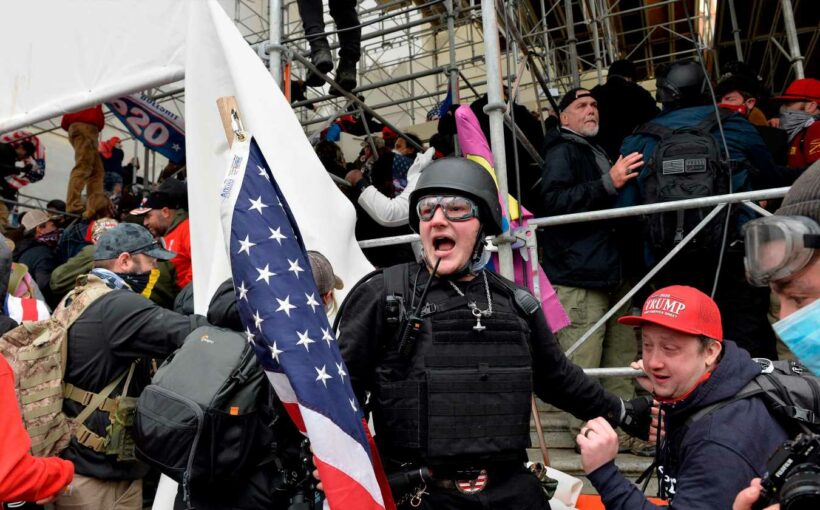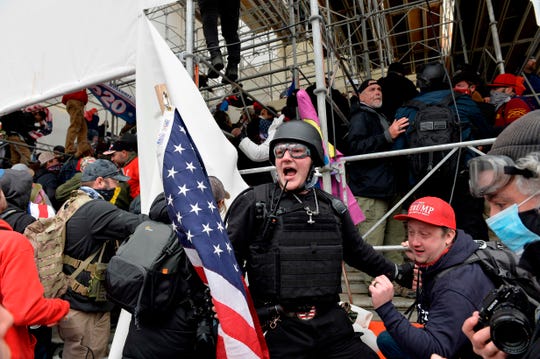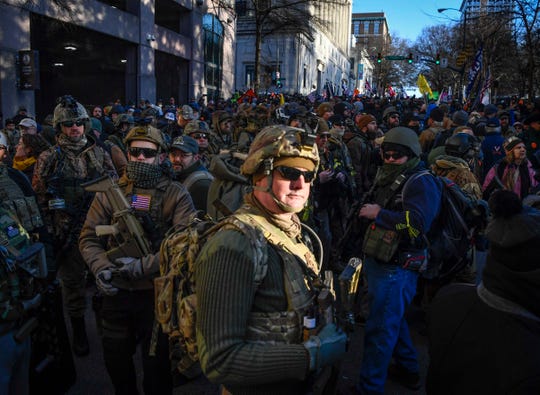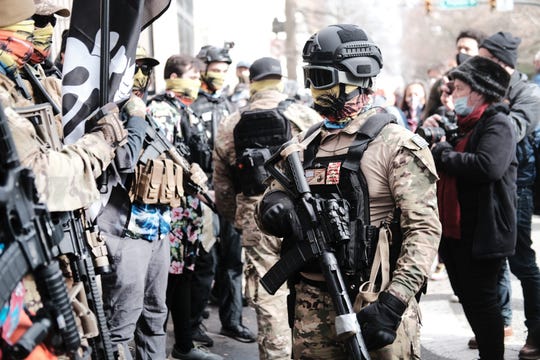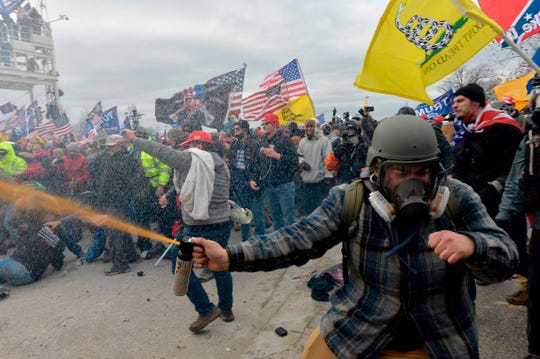Images of citizens dressed like soldiers – wearing bulletproof vests, ballistic helmets and combat boots – have been thrust into the spotlight following the U.S. Capitol riot Jan. 6 and civil unrest in the streets of America last summer.
Now companies that manufacture and sell military-grade gear face an ethics quandary: Business may be booming, but at what cost? Some say it’s out of their hands. Others are trying to distance themselves from the extremists.
“Many of these people aren’t serious about buying duty gear, they’re doing it for show and don’t represent the body armor community in any way,” said Nick Groat, CEO of Safe Life Defense, whose company has been accused of serving up ads to extremists on Facebook.
A man in a ballistic helmet and cloth plate carrier calls on people to raid the U.S. Capitol as supporters of President Donald Trump clash with police and security forces in Washington, D.C., on Jan. 6. (Photo: JOSEPH PREZIOSO, AFP via Getty Images)
Market analyst Technavio reports the tactical and outdoor gear industry is growing globally by about $1 billion in revenue each year, with increasing demand by private security firms, outdoor recreation and “a novel fashion trend.” It estimated that market soon will pass $16 billion in annual revenue.
According to a rolling USA TODAY analysis of the court documents for people charged in the Capitol riot, at least 20 were spotted in photos and videos wearing tactical gear. One popular item was a cloth plate carrier, which is designed to hold bulletproof plates and often includes pouches for ammunition magazines and Velcro for patches.
Federal prosecutors say Ohio bartender Jessica Watkins wore “camouflaged battle fatigues, a tactical vest emblazoned with an Oath Keepers patch, combat boots, military grade helmet, and radio equipment.”
Clothing brands such as San Antonio-based Grunt Style also got caught up in the situation. Grunt Style promotes patriotism and living the credo, “This We’ll Defend,” the U.S. Army’s motto. In January, after a photo of a rioter at the Capitol wearing one of its sweatshirts went viral, the $100 million apparel manufacturer faced questions from customers and media about where it stood on the riot.
Grunt Style CEO Glenn Silbert worked quickly to get a message out: “To be clear, we will not associate with anyone who threatens our Republic or promotes violence.” Silbert said the brand doesn’t want to tell people what to think or feel but wanted everyone on its 3 million customer list to know its position.
“We focus on pride in self, military and country; that’s our audience,” Silbert said. “Like any brand, you’ll have people who identify with the brand even when the brand doesn’t identify with them.”
Company caters to ‘citizens,’ not police or Biden voters
Gun rights advocates and members of armed groups gather at Virginia's Capitol in Richmond to protest gun control legislation. (Photo: Jack Gruber, USA TODAY)
For decades, much of the multibillion-dollar tactical gear industry has sold exclusively to military and law enforcement agencies. The world’s largest, including Honeywell and BAE Systems, still won’t sell directly to consumers. Some fear risking lucrative police and military contracts by selling to individuals who could land them in headlines – and photo spreads.
On the flipside, Michigan’s Justin Nazaroff, manufacturer of Fenix Ammunition, has been an outspoken critic of both President Joe Biden’s gun policy agenda and the coronavirus response by Gov. Gretchen Whitmer. He garnered attention last year for marketing his ammunition on social media with memes and selling custom Hawaiian shirts popular with the boogaloo movement, a loosely organized far-right, anti-government extremist group.
This year, he decided to draw a bright line for customers. After receiving a fine for failing to comply with mask requirements inside his suburban Detroit store, he decided to stop selling to police. On his website, he also asks visitors whether they voted for Biden. If they click yes, they’re directed to the campaign’s gun policy site and blocked from buying anything.
Nazaroff defends posting memes about the boogaloo movement, saying it’s a group of misunderstood advocates, not white supremacists. But he says he’s not marketing to a specific market segment, either, and rejects any notion that his customer base is dominated by extremists.
Members of the Boogaloo Boys join other gun rights advocates in front of the Virginia State Capitol in Richmond on Jan. 18. (Photo: Spencer Platt, Getty Images)
“Second Amendment absolutists and extremists aren’t the same,” Nazaroff said. “I don’t want customers who don’t believe in the Second Amendment or vote for political candidates that will pass laws to take away the Second Amendment.”
The Biden gun regulation agenda, he said, represents an existential threat to his employees, whose salaries are tied to the availability of internet ammunition sales –something the president wants to outlaw.
Rob Pincus, who debated Nazaroff recently in an online forum, said the company’s hard line, along with people wearing tactical gear to a political protest as an intimidation tactic, give the conservative and guns rights communities a bad name.
Pincus, executive vice president of the Second Amendment Organization, is seeking to reform the National Rifle Association and speaks frequently about a more inclusive gun culture.
“It’s horrible optics to have a guy in a plate carrier and his AR (semi-automatic rifle) yelling that, ‘If you don’t pass this law, I’m coming back for war,’” Pincus said. “It’s their right. Open carry should be legal; body armor should be legal. But this is the First and Second Amendment intermingled. You have to exercise those rights responsibly.”
Images of people openly carrying firearms and protesters clad in body armor multiplied throughout 2020, with a pro-gun rally in Virginia in January, statehouse protests against coronavirus lockdowns in Michigan and Arizona, and unrest tied to the deaths of George Floyd and Breonna Taylor in Minneapolis; Louisville, Kentucky; Seattle; and Portland, Oregon.
Body armor is regulated by federal and, in many cases, state government. It’s widely defined in federal statute as “personal protective body covering intended to protect against gunfire.”
Felons convicted of violent crime under federal or state law are prohibited from possessing body armor, with exceptions in most states for certain employees like police. Some states, like Connecticut, go further and prohibit all felons from possessing the gear, and they require that purchases be made in person.
Businesses face delicate marketing decisions
A member of the Boogaloo Boys armed with an assault rifle, gas mask and combat helmet stands outside of the Oregon State Capitol in Salem, during a nationwide protest called by anti-government and far-right groups supporting President Donald Trump and his claim of electoral fraud in the 2020 election. (Photo: MATHIEU LEWIS-ROLLAND, AFP via Getty Images)
Pincus said some of those who sell firearms and survivalist brands capitalized throughout 2020 on civil unrest, even putting their corporate logos on the Hawaiian shirts worn by boogaloo adherents at protests, until the message became too extreme.
“You might have 500,000 people sharing a meme and 450,000 don’t really advocate for armed rebellion, but then you have those taking it seriously and they’re dog whistling, and want plausible deniability,” Pincus said.
Referencing the domestic terrorist who bombed the Oklahoma City federal building in 1995 who had attended meetings of the paramilitary Michigan Militia, he added: “It’s just like the reaction from brands after the ’80s and ’90s militias. No one wants to sell to the next Timothy McVeigh.”
Brownells, an online retailer of firearms and shooting supplies, also stocks survivalist and emergency gear like “bug out bags” and first aid kits. While the company advertised with a man in a Hawaiian shirt in 2020, a spokesman said it was a nod to Magnum P.I., the 1980s character played by Tom Selleck, not the boogaloos or anti-government activists.
“Brownells does not encourage anyone to engage in acts to overthrow the government through any means or marketing tactic,” wrote Ryan Repp, Brownell’s vice president of marketing.
Greg Ehrie, a former FBI section chief in charge of the nation’s domestic terrorism cases, now tracks extremist movements for the Anti-Defamation League. He said civil litigation or market forces are likely the only check on brands that go over the line in outfitting extremists with gear. He compared it to Juul, which was taken to task for marketing e-cigarettes to minors.
“It’s just like firearms. You have to be responsible with who you’re marketing to,” he said. “These brands have to ask themselves: Are you marketing to extremists? You have to ask why someone needs tactical night vision helmets for defense. That’s offensive gear.”
In recent years, 5.11 has emerged as a popular retailer of tactical gear, opening 73 storefronts nationwide, targeting law enforcement and first responders as well as consumers. It calls customers “operators” and “recreational enthusiasts” in its online ads.
By increasing its direct-to-consumer online sales, the company grew 16% last year despite a huge reduction in retail foot traffic during the pandemic. Revenue rose to $400 million, up from $300 million in 2017, according to the company’s year-end report released in February.
When Kyle Rittenhouse, the 17-year-old from Illinois, was arrested in the shooting deaths of two people during the Kenosha, Wisconsin, riot in August, the first images broadcast worldwide were of the teen wielding his AR-style rifle at his home, wearing a 5.11 logo T-shirt.
The company has not addressed that issue publicly and did not answer questions from USA TODAY. 5.11 is part of Compass Diversified Holdings, an investment company that also owns and manages businesses ranging from baseball bat maker Marucci to infant carrier designer ErgoBaby.
It likely won’t face fallout for Rittenhouse or pressure for selling tactical gear to extremists, either, said Larry Solow, an analyst for CJS Securities who covers the company on Wall Street.
In this Aug. 25, 2020, file photo, Kyle Rittenhouse, left, with backward cap, walks along Sheridan Road in Kenosha, Wis., with another armed civilian. Rittenhouse was among a number of armed men who converged on the city this summer, claiming to protect property owners from arson and theft. (Photo: Adam Rogan, The Journal Times via AP)
“It’s a wide demographic of police and ROTC buying their own gear, and now active and frontline workers spawning all this growth for 5.11,” Solow said. “I see no negative stigma from this fad of wannabes who like this look.
“And they’re not selling guns, so you don’t have that same concern of it winding up in the wrong hands.”
Facebook pauses armor ads, allows them to restart
In the wake of the Capitol riot, Congress and a group of state attorneys general raised alarms to Facebook about allowing tactical gear ads to be served up to extremist groups.
Some rioters who stormed the U.S. Capitol on Jan. 6 had better protective gear than law enforcement and security forces. (Photo: JOSEPH PREZIOSO, AFP via Getty Images)
Democratic Sens. Tammy Duckworth, Richard Blumenthal and Sherrod Brown sent a letter to the social media company in January asking the platform to “permanently prohibit advertisements of products that a reasonable observer would interpret as primarily designed for use in lethal tactical operations and armed combat.”
In response, Facebook announced a ban on ads for weapon accessories and protective equipment through Jan. 22. That pause has since expired.
The company declined to answer questions from USA TODAY but pointed to its January letter to Congress about banning 250 groups tied to boogaloos, QAnon and white supremacists.
Safe Life Defense, the Las Vegas company that produces tactical vests aimed at first responders and security guards, was accused by the Tech Transparency Project, a nonprofit watchdog group, of targeting extremists on Facebook. The company’s CEO, Groat, said it relies on Facebook’s algorithm for which groups sees its ads – and that it polices comments on posts for extremism or abuse.
“There’s .001% of people who wear body armor and act improperly, and that small group is causing problems for the industry,” Groat said. “This isn’t a product that causes violence, this is a safety product. I don’t see a need to restrict that.”
Nick Penzenstadler is a reporter on the USA TODAY investigations team, focusing primarily on firearms and consumer financial protection. Contact him at [email protected] or @npenzenstadler, or on Signal at (720) 507-5273.
Source: Read Full Article
